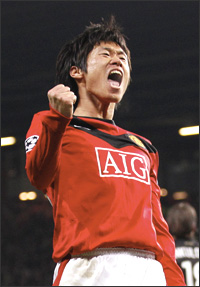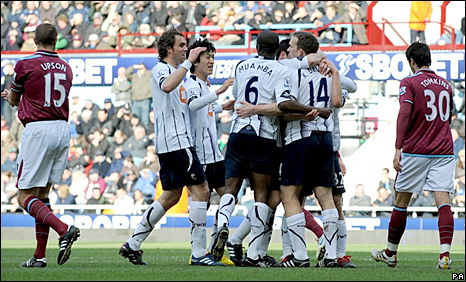Well, what can I say about Park Ji-sung’s performance on Wednesday night for Manchester United against AC Milan in the Champions League? For that matter, what more can be said about United that they haven’t already said with their performance? Park was one of the best, most influential players on the pitch, perhaps even the best. Rooney will undoubtedly steal the headlines with his superb two goals, taking his tally up to thirty for this season. Beckham may grab a few with his long anticipated return to Old Trafford. But this was an inspiring team performance by united.
At the back, Ferdinand and Vidic were immense and impassable, and they showed why United miss them so much when one or both is out injured. For United’s sake, they need them both now to stay fit for the rest of the season. In midfield, Fletcher was brilliant, and seemed to make no mistakes whatsoever. Scholes was his usual industrious self. Valencia showed once again why he was the perfect player to bring in once Ronaldo was sold to Real Madrid – another astute signing by Ferguson. Nani had a sloppy first half, but absolutely terrorised Milan in the second half with his pace and skill.
But for me it was the tactical decision by Ferguson to play Park centrally just behind and supporting Rooney that allowed United to play such a fantastic game, with flowing attacking football and an airtight defence.
The Manchester United lineup for the match was:
Van Der Sar
Neville Ferdinand Vidic Evra
Scholes Fletcher
Valencia Park Nani
Rooney
This isn’t the first time Ferguson’s used Park in the centre this season, but it is the first time he’s done so and also played both Nani and Valencia on the wings at the same time. I think we can be expecting this lineup a bit more often in future. Having Park in a central position allowed Fletcher and Scholes to play slightly deeper, to pick up any attacking runs from the Milan midfield, and most importantly, it gave them time and space to play accurate, creative passes from deep to the more attacking players.
Park is probably not quite as quick as Nani and Valencia, and less likely to dribble round the opposition full backs, so this formation also gave United added width in attack, and more pace than Milan could handle. Park’s energy levels meant that the Milan defense just couldn’t track his runs, which were clever, and either meant he received the ball in a good attacking position or created space for Rooney to.
When United didn’t have the ball, Park was man marking Andrea Pirlo, the player who pulls all the strings for Milan in midfield from a deep-lying position. With Park never more than a metre away from him when Milan had the ball, Pirlo was essentially useless, unable to find the time or space to direct Milan’s attacking play, making the job much easier for United’s defense. Also, with the creative playmaker so tightly watched, Nani and Valencia don’t have to overcommit themselves in defense, meaning they can break quicker when United break.
Now, I couldn’t analyse Park’s performance in this match without discussing his excellent goal. After Rooney had scored two already, essentially killing off any Italian hopes of a comeback, Park produced a slick finish for United’s third.
As this clip shows, United started the move with Park in a defensive position, which allowed Nani to react to quicker to go on the break. Then, with Park playing in the middle of Nani and Valencia, he was able to receive the ball from Nani on one wing and spread it to Valencia on the other, before receiving it once again from Scholes in the area. His first touch was perfect, and it allowed him to beat the defender and head for goal. He stumbled, but recovered well to pull off a fine finish low to the keeper’s right. A well taken goal, and very well deserved.
Here we see Park’s direct contribution to United’s fourth of the match, scored by Darren Fletcher, as he wins the ball back with a clever turn with United in an attacking position. Young Rafael provided the deep cross, and Fletcher was making the run to the back post to head in. It’s important to bear in mind that this was after United were 3-0 up, and they were still looking to attack, with running across to recover the lost ball. There’s really no need for him to do so in that position, there’s no real threat for Milan in a position like that, but I think it shows how he’s willing to go above and beyond what is simply necessary for the good of the team.
An excellent performance by Manchester United, who go on to the next round, and a wonderful performance by Park Ji-sung, crowned with a goal in the champions League. I’ll finish with the words of one Manchester United fan regarding Park: “He made the two victories possible really, he’s a great player to have form a tactical point of view,” and those of manager Sir Alex Ferguson: “Ji-Sung Park, in particular, showed sacrifice, intelligence and discipline and we needed that against Andrea Pirlo.”










